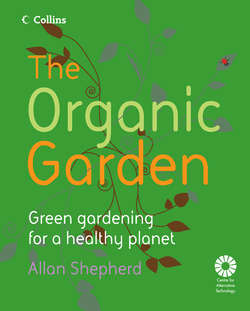Читать книгу The Organic Garden - Allan Shepherd - Страница 11
Six: value lies in the land
ОглавлениеJuly 2006 saw two of the hottest days ever recorded in Britain. The beautiful damp, lush green Wales I know and love started to look like the Mediterranean. First, CAT gardener Roger MacLennan recorded the highest temperature in his garden in twenty years. Then the next day the record was broken. In 2006 the Welsh rain failed us. A temporary blip or a sign of things to come?
The question that concerns me most is how can we garden and live in an era of climate change without losing the peace, security and good living we enjoy today? As the government’s chief advisor on the issue has already suggested, climate change is now a matter of national emergency. Perhaps we need to conjure up the spirit of that other great national gardening effort, the Dig for Victory campaign of the Second World War, to look forward to our better world. To rekindle a love of gardening in a time of global crisis would be a wonderful thing.
But what kind of gardening should we aspire to? In the future, will each of us need to garden for self-sufficiency and put our leisure pursuits to one side, just as millions of people did during the Second World War? Or is this a different kind of crisis, where it is more important to use our gardens as little centres for well-being and low-carbon lifestyles?
When I’m in my garden I buy less music, I rent fewer DVDs, I don’t go out so much. I stay in, I dig, mend, make, plant, plan. I travel less. Use less electricity. Need no space heating. I invite people round and we party. It’s all a way of cutting my carbon use.
I figure if I can build a good life for myself here, one that is continually refreshed by new experiences of my garden, landscape and home town, I don’t need to travel or pursue carbon-costly activities. I’m trying to kick carbon addiction by creating a low-carbon lifestyle and my life is all the richer for it. I’m not saying I’m perfect, but my garden helps me keep within what the carbon experts say is a global fair share of carbon emissions – 2.6 tonnes of CO2 per year, compared to a UK average of 10 tonnes – the amount of carbon every person in the world could produce each year without causing global climate change. I’ve long since given up on the idea of total self-sufficiency. CAT’s Peter Harper once calculated the productivity of his garden. He weighed everything that came out of it – vegetables, fruit, garden waste, wood, the lot – for a year. He wanted to see in percentage terms how self-sufficient an average garden could be. He calculated that his garden could generate around 0.5 per cent of his annual space-heating demand in wood cuttings and about £140 worth of fruit and vegetables (at 1997 prices). After removing the cost of seeds and plants from this total, the economic value of his garden amounted to 0.9 per cent of total household expenditure. The true value of a garden lay not in its economic output, however, but ‘in terms of entertainment, therapy, exercise, education, contribution to environmental quality, nutrition, convenience, gourmet delights and sheer connectedness with the Earth’. In other words, all things that are priceless.
Self-sufficiency is a grand ideal but it may not be what is needed during this period of global climate change. My friends Tom and Lisa Brown (pictured above left) have a smallholding and grow almost all their own foods, make endless amounts of honey, jams and chutneys, and generally lead what you might describe in the old cliché as ‘The Good Life’. But they have a lifetime of learning under their belts and several acres of land in which to make their dream possible. The good life is a good life but it is also a full-time occupation. When I walk around Tom and Lisa’s place I am struck by their absolute commitment to the value of land, and their place in the history of the land they now have stewardship over.
In this period of climatic instability we will need to care for our own little patches with equal passion. Bad weather erodes soil and weakens our plants. But if we know our land well we can help to do our bit to keep it strong and healthy. If we can guide our own gardens through the traumas that climate change may bring, we will have played our part.
